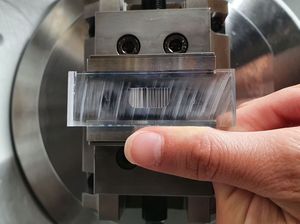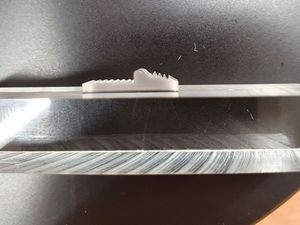Successful preliminary study: milling prototype lenses from polycarbonate
Lenses for distance measurement sensors, such as those used in time-of-flight cameras, can be only a few millimeters in size. In a preliminary study, RhySearch investigated how prototypes of the lenses can be milled from polycarbonate to validate the optical design as quickly as possible. This allows the function of the lenses to be tested without expensive injection molds.
Time-of-flight cameras are increasingly being used for distance measurement not only in automatic doors, but also in car driver assistance systems, robots, medicine and many other applications. Similar to laser scanning, the ToF method measures how long a light pulse "travels" to the object and back, and uses this to calculate the distance to this object. Unlike laser scanning, however, the object is not scanned, but rather a scene is recorded in its entirety, making this technology significantly faster.
The heart of a ToF camera is the sensor, and in this in turn the lens. This is about the size of a fingernail and its surface must be very smooth, otherwise the light would be scattered too widely and the measurement would not work. Injection molding tools are used for the mass production of the lenses. These must meet precise specifications in terms of minimum surface roughness and geometric accuracy. Their production and post-processing is correspondingly complex - and therefore expensive.
RhySearch's manufacturing laboratory has now developed a process for producing lens prototypes from polycarbonate and using these prototypes to validate the function of the lenses without the need for expensive injection molds. "The biggest challenges in this project were to keep machining times as short as possible while still not risking tool breakage. This is because the tools used have a diameter far below 0.5 mm and both the workpieces and the tools are extremely fine and filigree," explains the development engineer responsible, Kabil Ramadani.
Our website uses cookies so that we can continually improve the page and provide you with an optimized visitor experience. If you continue reading this website, you agree to the use of cookies. Further information regarding cookies can be found in the data protection note.
If you want to prevent the setting of cookies (for example, Google Analytics), you can set this up by using this browser add-on.






